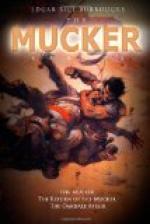“And say, speakin’ of banks,” he went on, “what’ll I do ‘bout sendin’ over to Cuivaca fer the pay tomorrow. Next day’s pay day. I don’t like to send this here bum, I can’t trust a greaser no better, an’ I can’t spare none of my white men thet I ken trust.”
“Send him with a couple of the most trustworthy Mexicans you have,” suggested the boss.
“There ain’t no sich critter,” replied Grayson; “but I guess that’s the best I ken do. I’ll send him along with Tony an’ Benito—they hate each other too much to frame up anything together, an’ they both hate a gringo. I reckon they’ll hev a lovely trip.”
“But they’ll get back with the money, eh?” queried the boss.
“If Pesita don’t get ’em,” replied Grayson.
CHAPTER X
BILLY CRACKS A SAFE
Billy Byrne, captain, rode into Cuivaca from the south. He had made a wide detour in order to accomplish this; but under the circumstances he had thought it wise to do so. In his pocket was a safe conduct from one of Villa’s generals farther south—a safe conduct taken by Pesita from the body of one of his recent victims. It would explain Billy’s presence in Cuivaca since it had been intended to carry its rightful possessor to Juarez and across the border into the United States.
He found the military establishment at Cuivaca small and ill commanded. There were soldiers upon the streets; but the only regularly detailed guard was stationed in front of the bank. No one questioned Billy. He did not have to show his safe conduct.
“This looks easy,” thought Billy. “A reg’lar skinch.”
He first attended to his horse, turning him into a public corral, and then sauntered up the street to the bank, which he entered, still unquestioned. Inside he changed a bill of large denomination which Pesita had given him for the purpose of an excuse to examine the lay of the bank from the inside. Billy took a long time to count the change. All the time his eyes wandered about the interior while he made mental notes of such salient features as might prove of moment to him later. The money counted Billy slowly rolled a cigarette.
He saw that the bank was roughly divided into two sections by a wire and wood partition. On one side were the customers, on the other the clerks and a teller. The latter sat behind a small wicket through which he received deposits and cashed checks. Back of him, against the wall, stood a large safe of American manufacture. Billy had had business before with similar safes. A doorway in the rear wall led into the yard behind the building. It was closed by a heavy door covered with sheet iron and fastened by several bolts and a thick, strong bar. There were no windows in the rear wall. From that side the bank appeared almost impregnable to silent assault.
Inside everything was primitive and Billy found himself wondering how a week passed without seeing a bank robbery in the town. Possibly the strong rear defenses and the armed guard in front accounted for it.




